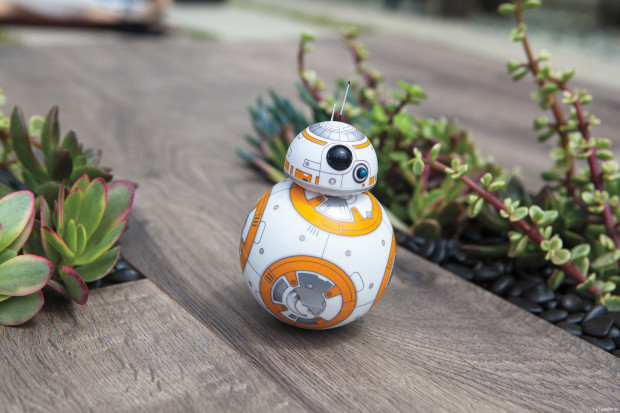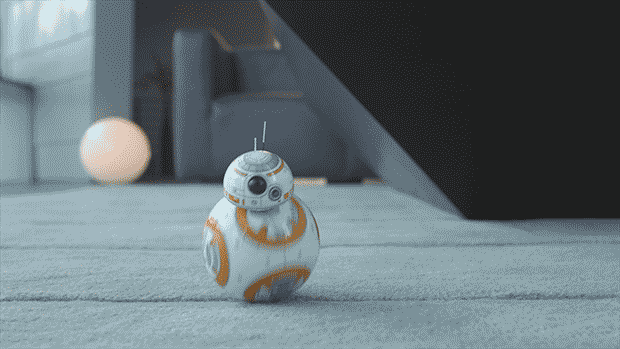
Ever since its appearance in the first trailer for The Force Awakens, Star Wars fans and robot fans alike have been eager to get their hands on the latest droid cast member, BB-8. Now, with the official release of BB-8 by Sphero, droid ownership is just $149 away. The toy officially goes on sale this Friday. I had the pleasure of secretly playing with BB-8 last week, but today I’ve been given the green light to talk about the product details and my first impressions.

What it Is
As Make: predicted and actually demonstrated back in April, the seemingly impossible mechanics of BB-8 takes its cue from the original Sphero, an R/C robot encased in a baseball-sized sphere. In terms of hardware, the BB-8 by Sphero toy is essentially a version of the Sphero skinned with a character design and magnetically coupled with a lightweight plastic head.
Because the head is attached to the body only by magnets, it can be removed. But I can say that having done this, removing BB-8’s adorable head feels like you’re decapitating Bambi. Best to keep his droid noggin where it belongs.

Because the motor and battery powering BB-8 are completely sealed up inside the body, the toy uses a unique inductive charging cradle. If you’ve ever placed an electric toothbrush on a charging cradle, it’s the same principle. BB-8 needs three hours of charge time to get one hour of play time, which isn’t so bad, plus the toy will cycle through a few cute head animations as he charges.
The App
What really distinguishes the BB-8 from all other Sphero products is the software you use to control and interact with it.
The Star Wars BB-8 app is available for your smartphone or tablet and is available for both iOS and Android. Communication between the app and the toy is done over Bluetooth, giving it a range of around 30 feet.
It’s also worth noting that there’s no speaker built into BB-8, so all of the quirky electronic bleeps and bloops that bring the character to life will come from the speakers or headphone jack of your phone or tablet.
Compared to other Sphero apps (of which there are many), the look and features of the BB-8 app feel around 80% Star Wars and 20% Sphero. Like any good Star Wars-branded software, it opens with John Williams’ soundtrack flourish. From the main menu you can pilot BB-8 around, trigger various preset routines, have BB-8 autonomously patrol the room, respond to voice commands, and virtually project holographic video messages.
Augmented reality is used to perform that last trick. By pointing the camera of your phone or tablet at BB-8 and viewing him on screen, the software can then add a virtual layer over the on-screen image making it appear as though BB-8 is projecting a holographic video similar to the way R2-D2 projected Princess Leia in the original Star Wars movie. It’s a neat and unexpected trick, and allows you to record, play, and send video messages to other BB-8 owners.
Hands-On Impressions
Some of my earliest childhood memories are playing with Star Wars toys, and I’m not embarrassed to admit that I still have quite a few of them. I wouldn’t call myself an aficionado of classic Star Wars toys, but I can remember my disappointment over Boba Fett’s rocket not launching, and the odd way they integrated the lightsaber into Darth Vader’s arm. For BB-8, I braced myself for disappointment.
I’m happy to report that in my experience the BB-8 by Sphero toy lived up to my expectations of both the character and of the value I’d want from a $149 toy. BB-8’s head had plenty of detail, including a pair of thin plastic antenna (non-functional) that I can imagine would have been an easy corner to cut.
Speaking of the head, you guys might be interested to know that the addition of BB-8’s head to the Sphero design was a tougher element to accommodate than you might think. One need only look at the Sphero BB-8 hack we featured in April to figure out the two practical concerns of adding a magnetic head to a ball-shaped robot.
The first problem is controlling the direction the head is facing. The hack we featured used a single magnet, leaving the head to randomly twirl (hilariously) as it moved. For the toy design, Sphero employed two magnets in the head, and I assume two in the body, allowing for precise control over where the head is facing and the capability of animating head movements.
The second engineering problem BB-8’s head presented was the additional momentum it added, making it difficult not to tip over while coming to a gentle stop. I thought the toy handled this well, though the team from Sphero admitted that it was a challenge dialing in the motion control for acceleration and deceleration planning.
Currently, when you speed BB-8 off in one direction his head leans back like a Looney Tunes character who’s feet are whipping out ahead of them. As he travels, his head slowly crawls forward in the direction he’s moving. As you bring him to a stop, the software intelligently steps down the speed to counteract the head’s forward momentum. If you crash BB-8 full speed into a wall, though, expect to see his head fly off — a problem that can be remedied quickly.
I raced BB-8 around on carpet and wood flooring and he handled both well. His self-balancing system seemed a little overzealous and twitchy on hard ground, but he was able to travel around much faster. On carpet, BB-8 seemed more confident and his movements smoother and more convincing.
I’m ambivalent about the need for a smartphone or tablet to control the toy. On the one hand it allows for a much richer experience, weaving in music and sounds, augmented reality, and a lot of fun little options you just couldn’t replicate on a standard R/C remote. That said, part of me wishes I could remove the barrier the screen puts between you and the robot and interact more directly with the little guy, baking in more autonomy into the toy itself.
But really, the only glaring disappointment I felt with the toy was only that it left me longing for a real, full-sized BB-8 to call my own. This guy is the Charlie Brown of robots, and you just want to reach out and give him a hug. You can’t do that at this scale. Fortunately, we’ve got multiple teams working with Make: to fill that void.
ADVERTISEMENT












